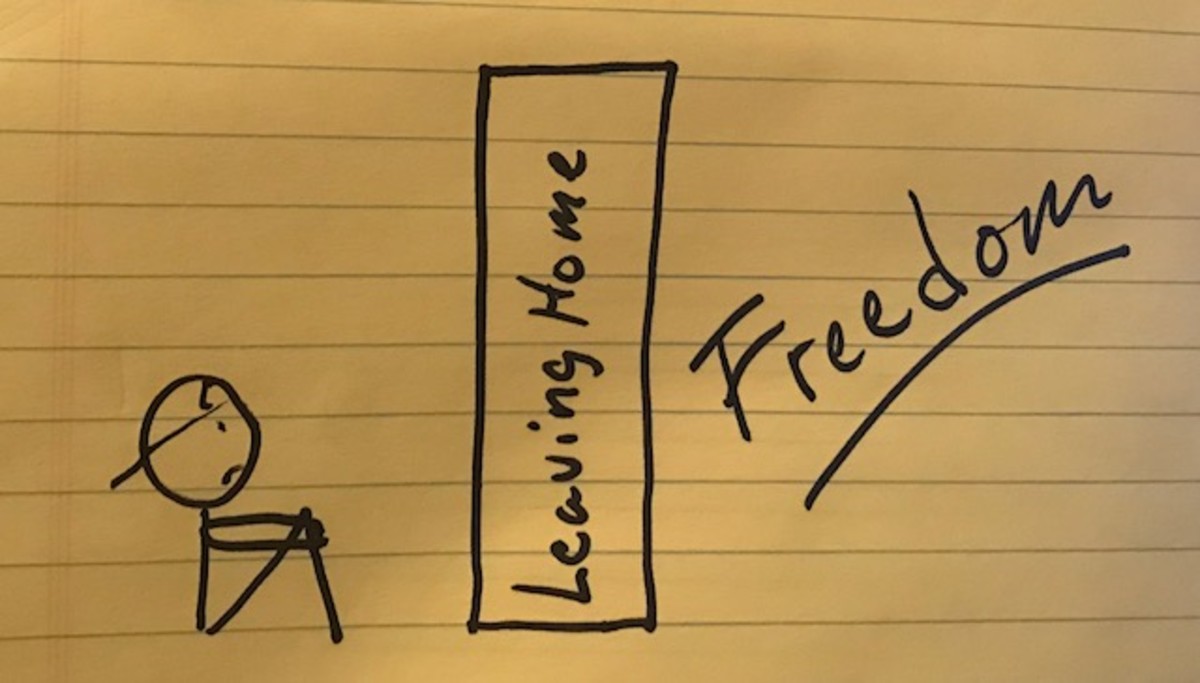- HubPages»
- Health»
- Quality of Life & Wellness»
- Personal Development
Get Off the Couch and Do Something! How to Motivate Your Child to Get On With Life
Introduction
How do you get a demotivated child to get up and work? How do you get your kid to get up, get moving and go get a job? How do you motivate your child to get become independent and prepare them to move out? What steps can you take to prepare an adult child for the real world and independence?

Step 1: Recognize Your Part in Causing the Problem
If you have a young adult at home who has no drive to do anything, the first step toward progress is realizing that you have enabled this behavior.
Throughout history, the vast majority of humans had to work to eat. Whether you got to this point by saying skip the chores and focus on studies while ignoring the time in front of the TV, by saying your teen never work had to part time because extracurricular activities are more important than a work ethic (and money) in order to get into college, the end result in never making them work the same: someone who has no work ethic and for whom a hard stop to the support and being forced into full time employment and contributing to the household for free is a major shock. And such a dramatic shift will make them angry.
Realize your prior mistakes, so that you can find the determination and will to correct it. You’re not being cruel by taking steps to cut them off – you’re making up for the mistakes you already made. If you don’t, your dependent young adult will face a horrific shock when you can no longer support them due to your own retirement or death. Resolve now to make them make steps toward independence and action, to save them the greater challenges of doing so later or a brute force cut off when your own finances make it necessary.
Step 2: If Toddlers Can Pick Up Their Toys, So Can the Teens and Grads
Require that the person contribute to the upkeep of the household. Make them clean their own living space, do their own laundry, assist with cooking. This is a minimum, and it is only a start. Recognize that this is training for when they are living on their own, and you want them to be able to live on their own.
Even if you intend on an inter-generational household, the young adult in your life will need to be able to clean it, shop for food, prepare food and so forth when you are physically unable to do so. Paying others to do these tasks is a luxury.
No one has the right to live lazily in your home while you pay someone else to pick up everyone’s mess and cut the grass, or expect you to work several hours a day maintaining the home after your own job for pay while they do nothing.
Step 3: Stop the Easy Money Leaks
Stop the easy money leaks. Do not give the person any more spending money for extras like dates and trips. Don't pay for anything that makes their lives easier or provides an excuse from hiding from the real world, like someone who earned a bachelor's degree wanting a master’s degree but unable to detail why this is truly necessary to find even part time work now. Refuse to pay for someone to hide in yet another training program or developmental retreat to “find their purpose”.
Self-actualizing is a luxury, and you wouldn’t be reading this if you weren’t worried about being able to pay for the essentials yourself or training a young adult to be able to do the same.

Step 4: Start Making Them Pay the Small Bills in Their Own Name
Stop paying for bills that should be entirely that person's responsibility, such as their cell phone bill, their traffic tickets, gas for their car, auto insurance, and any luxuries they are enjoying. One benefit of taking this step is that the individual may get odd jobs just to keep the $300 a month data plan or gaming subscriptions.
Step 5: Put a Number on It
Realize that a young adult living at home with free food, free utilities and so forth is a financial drain on you. Track the expenses that this person is racking up, separate from those bills you’ve forced them to take on. Letting someone live in your home for free is still a form of enabling. Calculating the true cost of this enabling allows you to see the actual burden they are imposing by not contributing financially, and it gives them an idea of what you’ve been spending to date to support them once you tell them.

Step 6: Present the Bill
This should take place at least a week or two after step 5. Set a time to have this discussion that is free of distractions and drama.
Sit down with the demotivated person and go over the total costs you’re absorbing to let them live there so that they understand how much living with you for free costs you. At this point, you are educating them as to the amount of money they are costing you.
At this time, open up discussion on how they can reduce their financial burden on you. For example, their friends can’t come over and eat all the food in the fridge. Reserve the right to deny them pets and live in partners when they aren’t capable of supporting themselves. If they are costing you money, they do not have the right to add to their burden on you – it isn’t fair to you. And, in the long run, it isn't fair to them.
Step 7: Negotiate Payment for Services Rendered
Don't suddenly charge a thousand dollars a month rent, but set the amount around a few hundred a month for rent and utilities, something they can achieve by working part time, in addition to paying for things like their car payment, gasoline and entertainment costs. This can be open to negotiation, unless you are personally in dire straights.
And in the interim, any contribution toward the household expenses helps. Receiving any money from your freeloading family member helps balance your own budget while preparing them for the eventual assumption of all of their own living expenses.
On a side note, don’t reduce the bill if they ramp up the household chores, because they will likely slide back into sloth as the supervision declines. Contributing to the housework is something they should have started doing by school age, and that is separate from contributing toward the bills you are paying and they are not.
Consider this training them for independence, when they have to clean their own apartment after coming home from work.
Step 8: Set a Date to Collect
Set a date at which you expect to receive a payment for rent and utilities. You should place this in a formal rental agreement. Putting it in writing and in a contract gives you the legal option later to kick them out of the house for not contributing, whereas an adult living with you for free may be able to fight an eviction.
The first payment may be due in two weeks or two months, but have a deadline by which point they have to pay you money for the bills you’re paying on their behalf.
And if they won’t agree to contribute, you know that it is time to kick them out because they won’t pick themselves up until it is off the street.

Step 9: Give Them Guidance But Not Hand Holding to Find Work
This is a trial run for adulthood. Let your young adult find a job, any job, to start bringing in money. A McJob for minimum wage now is still more than they were doing before, and it can motivate them to brush up on their social skills, improve their appearance or mitigate an attitude problem to be able to find a better position.
Trying five different jobs in five months is a learning experience in and of itself. At the very worst, your family member is learning what they don’t want to do and what never to do again.
Do not find the job for your family member. They were demotivated before because you did too much for them. If they cannot find a job without hand-holding, they will be less likely to seek employment, much less think they are capable of a better position. Let them find a position on their own. After all, there will be a time that you will not be there to help them find employment.
One side note to this is that spending hours applying online is pretty much a waste of time, especially for someone without job experience. The vast majority of jobs are filled through informal networks, while saying you are applying online provides cover for surfing the internet to fill in time and become demoralized because every resume disappeared into a digital black hole.
They need to walk into Subway and talk to the manager about a job, visit job fairs and apply in person, talk to every friend who works somewhere while asking for a referral or job lead at that company. And parents need to avoid escorting their child to the job or even trying to sell the person for the position. You’ll undermine any credibility that your child has. Give them guidance on wording on a resume, the proper presentation for the interview, places to apply to and even drive them to the interview. However, you have to let them try to fail so that they can learn how to succeed. If you don’t, you’re at risk of having to kick them out to surf on friends’ couches and learn the same lessons with even less grace.








